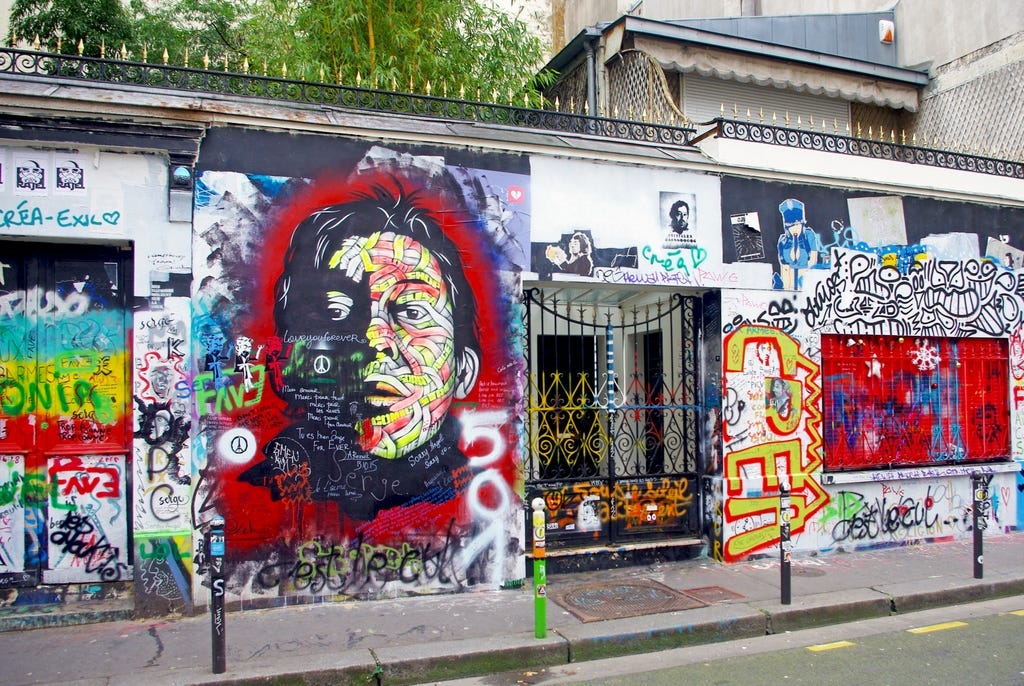The young Jane. “The archetypal English “dolly bird”, coltish, skinny, given to nibbling a plump lower lip and tossing hair out of her eyes. “
The death was announced today of the actress Jane Birkin. She was 76.
The Christmas 1974 issue of Lui, France’s Playboy, avoided the cliché cover of a glamor girl in a Santa hat and a smile. Instead, a languishing young woman stared out in unseasonal despair below the headline “Noël avec Jane Birkin.” Photos within showed her imprisoned in a cell-like room, wearing only black stockings and high heels, and handcuffed to a bare, battered iron bed.
That Birkin, an actress of modest gifts and, at least by Lui’s standards, an unremarkable body, should enjoy such celebrity had less to do with talent or beauty than with her personal life, which she shared with one of those individuals the French call monstres sacrés -sacred monsters. In an added attraction, her lover, the singer/songwriter/actor/director and all-round enfant terrible Serge Gainsbourg, not only conceived the photographs but wrote their somewhat gloating captions.
Birkin didn’t protest at being exposed in images which, a few decades before, were seen only on postcards sold only in the alleys of Pigalle. Far from it; she described the project as an act of love, a celebration of the contradictory emotions at the heart of her rapport with Gainsbourg. Such relationships were familiar to the French, as were such men - overbearing, unshaven, unwashed, untidy, rude.
They met in 1968 on the set of her first French film, Slogan, but there was initially no rapport. At twenty-two, she was the archetypal English “dolly bird”, coltish, skinny, given to nibbling a plump lower lip and tossing hair out of her eyes. Gainsbourg, eighteen years older, had a reputation as a tombeur – a seducer. "I found him complicated and arrogant during filming,” Birkin said. “He showed me no kindness; he made me very uncomfortable.” But that impression didn’t last. “In a single evening,” she said, “his character changed radically and I had fallen in love with him." When shooting ended, the two took a hotel room but, instead of having sex, put on a record and danced.
Gainsbourg had just ended an affair with Brigitte Bardot, with whom he recorded Je t’aime....moi non plus/I Love You....Neither Do I, an imagined dialogue, murmured against a muted musical background, between two people on the brink of orgasm. “You are the wave,” she whispers. “I am the naked island.” He responds “Like the undecided wave/I go, I go and I come....entre vos reins” : literally “in your kidneys,” which a translator, after toying with “into your guts,” rendered as “between your loins,” before censors dictated a less provocative “entre vos seins” – “between your breasts.”
After her husband heard the recording, Bardot begged Gainsbourg not to release it. “This song is yours,” he reassured her. “I will never record it with anyone else." The promise survived only until he met Birkin, with whom he made an even more incendiary version.
With Gainsbourg’s encouragement, Birkin blossomed as an actress, her schoolgirl gawkiness a piquant contrast to more voluptuous competitors such as Mireille Darc, and Romy Schneider, with whom she starred in Jacques Deray's steamy La Piscine. It was one of her most striking appearances in a career that numbered almost a hundred films, few of them as memorable.
She and Gainsbourg never married but lived together until 1980, Birkin initially accommodating his heavy smoking and drinking, as well as his aversion to shaving and bathing. As his alcohol consumption increased, however, he became physically violent.
Following a near-fatal heart attack just after the birth of their daughter Charlotte, he periodically assumed the character of an alter ego called Gainsbarre. His public appearances as Gainsbarre, unshaven, in dark glasses, usually drunk, with a smoking Gitane in hand, were always scandalous. In this persona he offended sensibilities everywhere by recording a reggae version of France’s national anthem, protested his high taxes by burning a 500 franc note on TV and, in his most notorious manifestation, while appearing with singer Whitney Houston on a talk show, announced to the national audience “I want to fuck her.” For Birkin, this was too much. “I could live with Gainsbourg,” she announced, “but not Gainsbarre.” They repaired their relationship but never again lived together.
When Charlotte was thirteen, she and her father made a record that aroused even more controversy than Je t’aime...moi, non plus. For Lemon Incest , they whispered and murmured, to the background of a Chopin étude, an intimate conversation in which he called his daughter an “exquisite sketch; delicious child; my flesh and my blood.” To an adult Charlotte, who became a successful actress, it was “an innocent declaration of love from a father to his daughter” but one critic called it “insanely perverse.” All agreed it was Gainsbarre at his inflamatory best and worst.
When Gainsbourg died in 1991, Birkin, her acting career waning, found a new audience as the guardian of his legacy. She recorded the songs he had written for her and sang them in a series of sold-out concerts. She also published her memoirs and diaries, and toured the world, performing his work. Their former home in the seventh arrondissement, easily identifiable from the graffiti-decorated outer wall, houses a museum, a bookstore and a combined piano bar, restaurant and performance space - called, inevitably, Le Gainsbarre.







Yes - in company with Gillian Hills, another naughty girl of the day, who also had a film career of sorts, some of it in France.
First sighted rolling round and eventually naked in the coloured paper in Antonioni's Blow Up I believe.